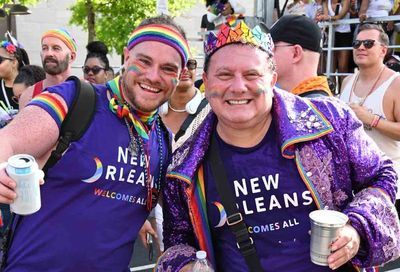Minnesota school district to pay $300,000 to transgender student barred from boys’ locker room
School district also agrees to adopt policies guaranteeing students access to facilities matching their gender identity.

A Minnesota school district has agreed to pay out $300,000 as part of a settlement reached with a former transgender student who was barred from the boys’ locker room due to his gender identity.
The student, Nick H., came out shortly before beginning his freshman year at Coon Rapids High School in 2015. The school’s principal assured Nick’s mother that her son would be safe at school.
Nick joined the boys’ swim team, and used the boys’ locker room along with his fellow students for months, without incident.
However, the school board intervened and began demanding that Nick be barred from the locker room because his gender identity did not match his assigned sex at birth.
In the summer of 2016, the Anoka-Hennepin school district constructed an enhanced-privacy bathroom as part of a locker-room remodeling.
Nick was the only student required to use the specialized bathroom and changing area, which was the only one of its kind in the district. He then sued, alleging the school board had unlawfully discriminated against him.
“I was doing my thing and then all of a sudden, I was going to be in trouble if I used the boys’ locker room,” Nick recalled during a Tuesday afternoon virtual press conference hosted by Gender Justice. “And I did rebel and I did use the regular boys’ locker room. And then I was sent to the principal’s office the next day and they said there’d be consequences, but wouldn’t specify.”
Because he was singled out at school and forced to use segregated changing facilities, Nick found himself becoming the victim of bullying, and had threats lodged against him and his family, causing him great emotional distress and harm.
His grades suffered, he became depressed, and over the next two years, he was hospitalized three times for mental health concerns, eventually deciding to transfer out of the district.
Nick recalled that a few times, some of the other students would lock him in the segregated locker room, causing him to be late for lunch or other classes.
Enlisting the help of the Minnesota civil rights group Gender Justice and the American Civil Liberties Union of Minnesota, Nick sued Anoka-Hennepin, alleging the district had violated his right to equal protection and due process under the Minnesota Constitution.
The district moved to dismiss the lawsuit, but a judge said that Nick had a right to sue for violations of his civil rights.
The district appealed that decision to the state Court of Appeals, which upheld the lower court’s decision, finding that “requiring a transgender student to use a different locker-room facility because of his sexual orientation is discrimination” under the state’s Human Rights Act and the Minnesota Constitution. Instead of appealing that decision, the school district ultimately decided to settle the case.
As part of the settlement agreement, the district agreed to pay $300,000 in monetary damages, and agreed to adopt several reforms reaffirming its commitment to protect transgender students from discrimination.
Among the reforms are a promise affirming that transgender students are protected under the Minnesota Human Rights Act and will not be discriminated against; a policy allowing transgender students to access restrooms and locker room facilities consistent with their gender identity; and a policy establishing a complaint procedure for transgender students who believe their rights have been violated and prohibiting the district from retaliating against complaining students. The district also agrees, as part of the settlement, to provide sensitivity training for school board members, faculty, and students as it relates to the ability of transgender students to access spaces consistent with their gender identity.
Nick’s lawsuit marked the second lawsuit against the Anoka-Hennepin School District over its policies regarding LGBTQ students.
The first alleged the district failed to curb bullying of LGBTQ students and created unequal access to education by permitting sex-based discrimination to continue. Nine students in the district committed suicide, allegedly because of the mistreatment they suffered, over a span of two years.
As a result of that lawsuit, the U.S. Department of Justice placed the district under a consent decree in 2012, which required the district to adopt policies, hire consultants on inclusive policies, document incidents of harassment, and submit annual reports to federal officials.
The district was still under that federal consent decree when it singled out Nick and barred him from using the boys’ locker room.
See also: Michigan teacher faces backlash for Facebook post complaining about transgender bathrooms
The Anoka-Hennepin School District said in a statement to the Minneapolis Star-Tribune that it has already modified its policies and procedures, including staff training, to ensure students will be able to access any facilities consistent with their gender identity, telling the newspaper: “All legal issues have been resolved.”
The organizations that had represented Nick during his lawsuit celebrated the settlement as an important development that sends a message to transgender and nonbinary students that they are worthy of protection.
“This case sends a strong message to school districts throughout the state. And that message is this: it’s unconstitutional for school districts to treat transgender students differently than than other students. And if they are treated differently, if they are discriminated against because they are transgender, it will not be tolerated. And school districts will be held accountable,” David McKinney, a staff attorney for the ACLU of Minnesota, said during the press conference.
“When we first filed this complaint, I said that the stakes are high and all too real. None of us knew then how true that would turn out to be,” Megan Peterson, the executive director of Gender Justice, added. “Two years later, policymakers in states across the country have introduced a record number of bills targeting transgender children and seeking to block them from participating in sports or getting the health care they need.
“Unfortunately, Minnesota is not immune from this trend. One state legislator here took the unprecedented step of introducing a bill that would actually impose criminal penalties for transgender students who use the locker room and play sports with their teammates,” Peterson noted.
“These harmful attacks on transgender youth at the Capitol are in direct violation of the rights our state’s constitution and laws already provide. In fact, in September of last year, in this case, the Minnesota Court of Appeals affirmed that our Constitution and the Minnesota Human Rights Act protect the rights of transgender students and that no child should feel they have to shop around to obtain a discrimination-free education.”
For his part, Nick said that despite having to relive some painful and embarrassing moments, he believes he has helped make a difference for other students who are currently enrolled in Anoka-Hennepin schools.
“I’m grateful that Anoka-Hennepin agreed to make the changes that they did. And I’m hopeful that they’ll continue to improve and treat every student with basic fairness and respect they deserve,” he said. “But mostly I want to say to the other kids: going through what I went through, I know it can be hard, but it’s possible to make change and say some things speak up rather than dealing with it yourself. Help is out there.”
Read more:
Fox News has consistently enabled anti-trans misinformation since Biden took office
LGBTQ advocates launch national campaign to pressure Congress to pass the Equality Act
Italians demand protections for LGBTQ people after anti-gay attack
Support Metro Weekly’s Journalism
These are challenging times for news organizations. And yet it’s crucial we stay active and provide vital resources and information to both our local readers and the world. So won’t you please take a moment and consider supporting Metro Weekly with a membership? For as little as $5 a month, you can help ensure Metro Weekly magazine and MetroWeekly.com remain free, viable resources as we provide the best, most diverse, culturally-resonant LGBTQ coverage in both the D.C. region and around the world. Memberships come with exclusive perks and discounts, your own personal digital delivery of each week’s magazine (and an archive), access to our Member's Lounge when it launches this fall, and exclusive members-only items like Metro Weekly Membership Mugs and Tote Bags! Check out all our membership levels here and please join us today!



























You must be logged in to post a comment.